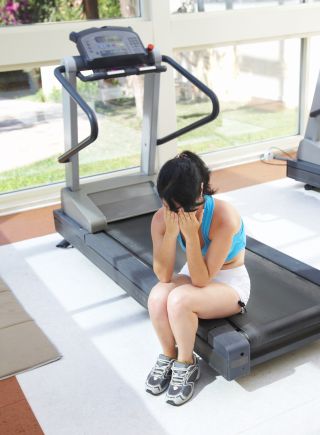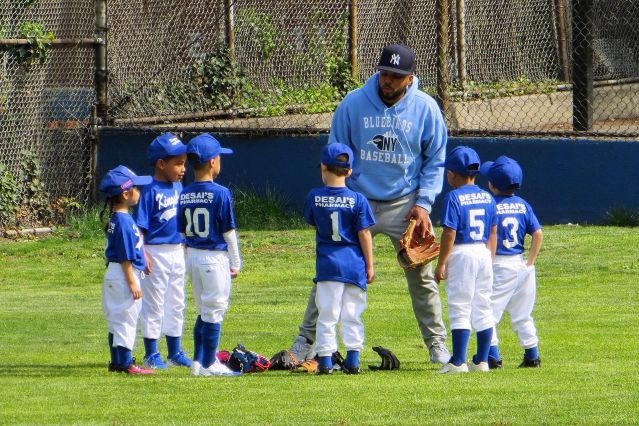Depression
Mental Health in Sports
Recognizing mental concerns can help people heal.
Posted April 21, 2023 Reviewed by Tyler Woods
Key points
- 1 in 5 adults will experience a mental health diagnosis in a given year.
- Nearly 60% of mental health disorders in adolescents are undetected and untreated.
- Life can be challenging, but every day shouldn’t feel hard or out of your control.

Mental health has become a common topic in sports. We are hearing more and more athletes of all levels talk about their concerns, difficulties, and successes related to mental health and wellness. However, stigma still exists which keeps some people from talking about their problems. In fact, Mental Health America reported that on average, it takes a person 11 years to seek professional help. Can you imagine suffering in silence for so long? Please know, you are not alone and talking with a licensed counselor can help.
How Do I Know When It Is Time to Talk With a Counselor?

Counselors can help with problems that arise during different times in life. You don’t have to wait until something is wrong to see a counselor. They can help you prepare for major transitions, such as moving from high school to college, learn communication skills and teamwork, understand career transitions, develop relationship skills, and so much more.
At the same time, if you find that your mind is so distracted that you have difficulty going about your daily life, including getting out of bed, doing school work, developing psychological recovery from an injury, going to training, going to work, or communicating with others, you can talk with a counselor to understand why you feel distracted and to develop skills that will help you navigate problems in a more constructive way.
Counselors assess, diagnose, and treat mental health disorders like anxiety, depression PTSD, eating disorders, and substance abuse. These, among other diagnoses, are common among athletes, and counselors who are trained in working with athletes have specialized knowledge about how these issues impact your sports.
Even though many people feel alone in their mental health journeys, it is important to know that everyone experiences roadblocks in life.
Here is a snapshot from the Centers for Disease Control (CDC) of people who experience mental health concerns:
- Over 50 percent of people will be diagnosed with a mental health disorder in their lifetime
- 1 in 5 adults will experience a mental health diagnosis in a given year
- 1 in 5 children have or will have a mental health diagnosis
Regarding suicide, in 2020 the CDC also reported:
- Nearly 46,000 people took their life
- 12.2 million people contemplated taking their life
- 3.2 million people planned to take their life
- 1.2 million people reported making an attempt to take their life
To provide crisis assistance in cases where people are feeling hopeless about life, in 2022 the 988 Suicide and Crisis Hotline was established. This free, 24/7 confidential support line aims to help people and their loved ones who are in distress. People can call, text, or chat with 988.
I Am Mentally Tough. Can I Still Experience Mental Health Problems?
The short answer is yes.
Athletes spend thousands of hours training their bodies, and more coaches, athletes, and trainers are paying attention to training people’s minds. Mental toughness is the ability to have focus and success on the field, manage difficulties and disappointments, and to request help or assistance when needed.
To help people in sports recognize common problems, the American Medical Society for Sports Medicine identified 14 common mental health problems people in sports face. These include: personality issues (athletic identity /traits); sexuality and gender issues; hazing; bullying; sexual misconduct; transitioning from sport; psychological response to injury and illness; self-medication in response to injury/illness; eating disorder/disordered eating; depression and suicide; anxiety/stress; overtraining; sleep; and attention deficit hyperactivity disorder (ADHD).
What Are Some Specific Examples of Mental Health Concerns in Sports?
Unfortunately, almost all populations including officials, coaches, and athletes experience mental health concerns.
Officials
- Officials (referees, judges) experience verbal abuse, aggression and disrespect from athletes, fans, and media, resulting in substantial stress.
- In one study, about 95 percent of officials experienced verbal abuse, 23 percent experienced physical abuse, and abuse resulted in increased anxiety, depression, and intention to quit.
Coaches
- Coaches are expected to design and deliver programming to facilitate improved individual and team performance in a safe environment, and to win.
- Coaches now hold multiple roles and relationships with athletes, parents, officials, organization, agents, etc.
- One study identified that stress in coaching comes from a lack of communication, unclear or unrealistic goals, and cultural issues.
- The same study found that professional coaches are equally as stressed as youth coaches—coaches of various levels have different kinds of stress.
- Coaches are expected to be responsible for the physical and emotional wellbeing of players and researchers have identified barriers to addressing mental health concerns, including lack of knowledge about the subject and repeated exposure to stress (player performance, criticism, organizational demands).
Elite Athletes
- Athletes competing at the professional, Olympic, or collegiate levels are considered elite.
- According to one study, 5 to 35 percent of elite athletes reported experiencing mental health symptoms in a given year.
- They reported similar complaints as the general population, with anxiety, depression, sleep issues, eating disorders, and substance use as primary concerns.
- However, elite athletes seek help less often than the general population (the idea of the “strong, winning athlete” contrasts with the image of a “weak, depressed person.”)
- Risks related to mental health include: training schedule, being away from family, injury, lack of retirement planning, levels of athletic identity, education level, post-sport unemployment, chronic pain, past counseling experiences, and racial or cultural differences.
Youth Athletes
- About 50 percent of common mental health disorders are present before age 18, including depression, anxiety, eating disorders, substance abuse.
- Nearly 60 percent of these disorders are undetected and untreated in adolescents.
- Youth elite athletes experience significant stigma related to mental health and have negative attitudes towards asking for help, sometimes due to fear of losing their spot on the team.
- In a recent study, nearly 17 percent of youth athletes reported current mental health concerns.
- 25 percent said the concerns have been something they’ve always experienced.
- Nearly 25 percent reported four or more symptoms across the last year or over their lifetime.
- Individual sport athletes reported more mental health concerns than team sport athletes.
- Girls are more likely to report symptoms than boys.
What Can We Do?

Life can be challenging, but every day shouldn’t feel hard or out of your control. – Mental Health America
We can work together to make mental health a priority. Individually and collectively, we can make a difference.
First, know the resources in your community and become familiar with counselors in your community/school/club. Next, If you see something, say something. Use open-ended questions to start a discussion with someone you are concerned about. A question like, “What’s on your mind?” can help someone share their feelings with you.
In addition to reading this article, you can learn the issues faced by people in your sport by doing an internet search or having casual conversations with other people in your groups. Those conversations will help you work together to decrease stigma related to discussing mental health.
Another idea is to take time to talk about how emotions impact us on and off of the field, and, in essence, that can help normalize talking about difficult emotions. For example, you can explain that mental toughness includes acknowledging our good times and our hard times.
By dedicate time to learn about emotions, you are taking steps to demystify mental health.
To find a therapist near you, visit the Psychology Today Therapy Directory.
References
Breslin, S., S., Cummings, M., & Leavey, G. (2022). An updated systematic review of interventions to increase awareness of mental health and well-
being in athletes, coaches, officials and parents. Systematic Reviews, 11(1), 2–29. https://doi.org/10.1186/s13643-022-01932-5
Brick, Breslin, G., Shevlin, M., & Shannon, S. (2022). The impact of verbal and physical abuse on distress, mental health, and intentions to quit in sports
officials. Psychology of Sport and Exercise, 63, 1 - 10. https://doi.org/10.1016/j.psychsport.2022.102274
Carson, Malakellis, M., Walsh, J., Main, L. C., & Kremer, P. (2019). Examining the mental well-being of Australian sport coaches. International Journal of
Environmental Research and Public Health, 16(23), 4601. 1 - 12. https://doi.org/10.3390/ijerph16234601
Castaldelli-Maia, J. M., Gallinaro, J. G., Falcão, R. S., Gouttebarge, V., Hitchcock, M. E., Hainline, B., Reardon, C. L., & Stull, T. (2019). Mental health symptoms and disorders in elite athletes: A systematic review on cultural influencers and barriers to athletes seeking treatment. British Journal of Sports Medicine, 53(11), 707–721. https://doi.org/10.1136/bjsports-2019-100710
Centers for Disease Control. (2021). About mental health. https://www.cdc.gov/mentalhealth/learn/index.htm
Centers for Disease Control (2022). Facts about suicide. https://www.cdc.gov/suicide/facts/index.html
Chang, Putukian, M., Aerni, G., Diamond, A., Hong, G., Ingram, Y., Reardon, C. L., & Wolanin, A. (2020). Mental health issues and psychological factors in
athletes: detection, management, effect on performance and prevention: American Medical Society for Sports Medicine Position Statement—Executive
Summary. British Journal of Sports Medicine, 54(4), 216–220. https://doi.org/10.1136/bjsports-2019-101583
Mental Health America, 2022. May is Mental Health Month 2022 outreach toolkit. https://mhanational.org/mental-health-month-2022-toolkit-download
O’Connor, Grove, C., Jeanes, R., Lambert, K., & Bevan, N. (2023). An evaluation of a mental health literacy program for community sport leaders.
Mental Health & Prevention, 29, 200259, 1 - 8. https://doi.org/10.1016/j.mhp.2023.200259
Purcell, R., Henderson, J., Tamminen, K. A., Frost, J., Gwyther, K., Kerr, G., Kim, J., Pilkington, V., Rice, S. M., & Walton, C. C. (2023). Starting young to protect elite athletes’ mental health. British Journal of Sports Medicine, 57(8), 439–440. https://doi.org/10.1136/bjsports-2022-106352
Substance Abuse and Mental Health Services Administration (2022). 988 & Crisis Lifeline. https://www.samhsa.gov/find-help/988
World Health Organization. (2022). Mental health: Strengthening our response. https://www.who.int/news-room/fact-sheets/detail/mental-health-strengthening-our-response




